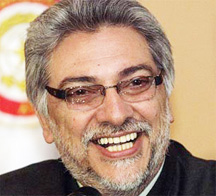CAPITAN GIMENEZ, Paraguay, (Reuters) – No one thought to mention it when they heard whispers and rustling in the bushes near the police station in Capitan Gimenez, assuming it was the hushed voices of lovers in the dark.
The two officers on guard had just finished dinner when gunmen ambushed the station, killing them both. Another had gone out to buy credit for his mobile phone. In this remote corner of northern Paraguay, cattle-rustling is the most common crime.
“You can’t forget something like that,” said Jose Gamarra, 24, another officer at Capitan Gimenez who was also out when the group of as many as 10 heavily armed attackers struck the village station one night in late September.
Officials were quick to blame the Paraguayan People’s Army, or EPP by its Spanish initials, a small left-wing group that mixes violence with a revolutionary rhetoric reminiscent of the guerrilla movements that sprang up across Latin America in the 1960s and 1970s.
Most such ideological groups have faded away since then and criminal gangs linked to drug-trafficking are responsible for surging rates of violent crime in much of the region.
The EPP has gained prominence in recent years due to several high-profile kidnappings and daring raids and President Fernando Lugo is under mounting pressure to close the net on the gunmen.

He has sent troops and more than 1,000 extra police to the group’s heartland in the ranching provinces of Concepcion and San Pedro for a 60-day crackdown due to end next month. But catching the EPP’s leaders will not be easy.
The group’s armed members are thought to number no more than 20, relying on close friends and relatives for logistical support in a deprived and long-forgotten region where suspicion of the police runs deep.
“Sending tanks isn’t the answer. It’s sending tractors, doctors and making sure people have shoes … and roads, that would be a lot more effective,” said Raquel Talavera, a lawyer who used to defend jailed members of the group.
Some opposition members of Paraguay’s fractious parliament have threatened to start impeachment proceedings against Lugo if the security crackdown fails to yield results, said center-right lawmaker Sebastian Acha.
“There’s going to be a lot of political pressure when the (operation) ends, which most opposition members from the traditional parties are going to use as a bargaining chip to force concessions from the president — a job, a nomination,” he said.
It is another potential headache for Lugo, whose presidency has been complicated by divisions in his ruling coalition, a lengthy cancer treatment and paternity claims by three women. He has admitted fathering one child when he was a bishop.
Almost every police station in Paraguay has a “Wanted” poster carrying mug-shots of the armed groups’ leaders, offering rewards of up to one billion guaranis (about $250,000) for information leading to their capture.
It is a fortune in a region where few earn as much as the minimum monthly wage of about $400, but fear of reprisals and mistrust of authorities mean people are wary of speaking up.
“If you talk, they’ll harm you or your family so no one talks,” said Vicenta Sanchez, 55, standing behind a stall selling fresh herbs in front of the church in Horqueta.
“Everyone is scared of them, we’re all afraid,” she said.
An added discomfort for the president stems from several of the EPP leaders’ past links to the Roman Catholic Church in Concepcion and San Pedro, where Lugo served as a bishop.
“Their training was here in the church, but then they lost their way,” said Nelson Ramirez, a priest in Horqueta as he sipped traditional yerba tea from a metal straw in the church hall.
“They wanted to follow the Marxist path and because of that they were expelled from the seminary,” he said. “It’s very painful for us.”








